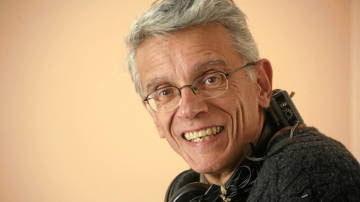
I have seen only two of Bernard Émond’s films so far — La neuvaine aka The Novena (2005), which he wrote and directed, and Ce qu’il faut pour vivre aka The Necessities of Life (2008), which he simply wrote — but what I have seen, I have liked.
He’s an admittedly secular filmmaker, not a religious one, but he is sensitive to the role of religion in people’s lives, and I am especially interested in his other films now that I hear La neuvaine was conceived as the first part of a “trilogy” on faith, hope and love. Quoth today’s Globe and Mail:
La Donation, which opened last fall in Quebec, completes the Montreal writer-director’s trilogy exploring the theological virtues of faith (La Neuvaine, 2005), hope (Contre toute espérance, 2006) and, now, charity through stories of personal and cultural loss. If it all sounds heavy, be assured there is nothing heavy-handed about Émond’s deft, emotionally rich observational filmmaking, which has been lauded by festivals, critics and award juries since he turned from documentary to features with La Femme qui boit in 2001.
La Donation revolves around Jeanne (Élise Guilbault), a Montreal emergency-room doctor who was also the central character in the trilogy’s first film. Here, she arrives in the small Abitibi town of Normétal as the temporary replacement for the local doctor (Jacques Godin), who is nearing retirement and planning a short vacation. When he unexpectedly dies, Jeanne must tend to the community while considering her own future. “In the first film, Jeanne witnesses an assassination, holds herself responsible and is saved from killing herself because of a stranger’s kindness,” Émond explained during the 2009 Toronto International Film Festival. “After that I wondered, what can be her life? What is a meaningful life?”
The “totally secular answer,” the self-described “non-believer” said, can be found in La Donation and its small-town setting. “We live in a society motivated by the logic of greed and I think we must reconnect ourselves with the logic of giving, which is so pervasive in traditional societies,” said Émond, a trained anthropologist who worked for Inuit television in the Arctic earlier in his career. “We live in a system of exchange. I give you 10 bucks, you give me pair of shoes; after that, if you die, I don’t care. Whereas in a traditional society, I give you something and maybe you don’t give me something right now but you owe me. Maybe your descendants will give something to my descendants. The added benefit of giving is that it creates ties.”
Remembering Gilles Groulx’s 1960 National Film Board documentary Normétal, Émond decided to scout the town as a possible location. “When I stopped my car in front of the church, I was completely overtaken by a feeling of melancholy because the town I had seen in the film was no more,” he recalled. “Abitibi is one of the great chapters of Quebec history and one of the saddest. These are places where people created new communities, but these villages and their way of life are disappearing.
“Since my films explore different facets of loss and grief, Normétal was a very cinematographic place just waiting for its film – waiting for my film,” he added with a laugh.
La donation opens in Toronto this coming Friday; I do not know whether, or when, it will be coming to Vancouver.












